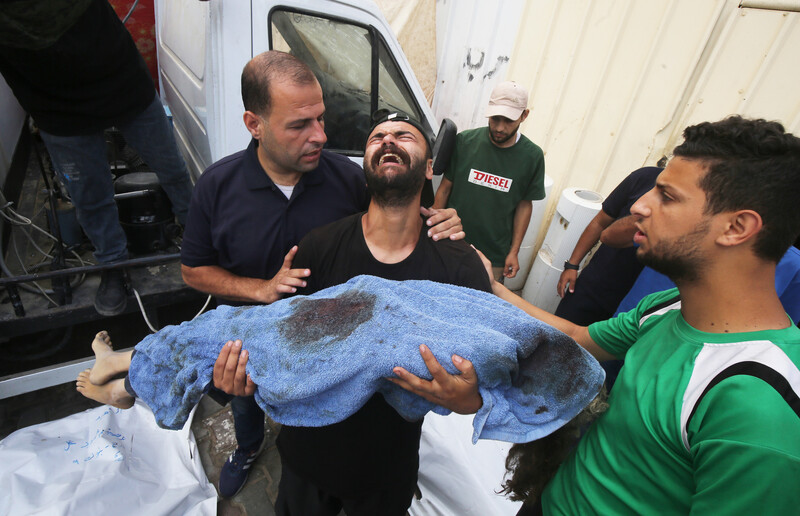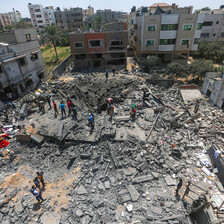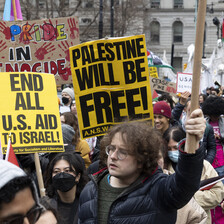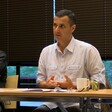The Electronic Intifada 3 July 2024

Victims of an Israeli attack on Bureij refugee camp are brought to Al-Aqsa Martyrs Hospital in Deir al-Balah, central Gaza Strip, on 3 June.
APA imagesLast month, an independent UN Commission of Inquiry presented its findings on the situation in Palestine and Israel since 7 October during the 56th session of the Human Rights Council.
I was invited to comment on the commission’s reports during a side event at the Human Rights Council, during which I laid out how the commission fell short of meeting its obligation of truth-telling:
The commission published two separate reports: a 59-page report on events in Israel on 7 October and a 126-page report on the assault on Gaza beginning 7 October through the end of December.The deficiencies of the reports, which narrate some of the major events and provide legal analysis, include the absence of the term “genocide” to describe the ongoing onslaught in Gaza; a lack of discussion of the role of incitement to genocide by third states and international media; a forced two-sided balancing narrative; good-faith engagement with Israel’s bad-faith human shielding argument; the absence of tangible recommendations for third states and corporations; an uncritical reliance on Israeli sources while ignoring the work of Arab and independent media.
These faults are just the tip of the iceberg.
The commission is tasked with truth-telling in the context of atrocity, with a particular focus on examining the root causes of international legal violations in Palestine.
The UN’s mandate requires the protection of precarious populations at risk of atrocity. If one is genuine about their intention to tell the truth and protect in times of atrocity, one must reflect on lessons learned from past atrocities. So how do we understand atrocity based on lessons learned from history?
To begin with, atrocity crimes do not happen in a vacuum.
Palestine is a rare contemporary case of settler-colonialism, as it was colonized at a time when the rest of the world was on the verge of decolonization.
The Oslo accords signed by Israel and the Palestine Liberation Organization in the mid-1990s blurred this reality by painting a picture of “negotiated peace.” It is now clear that the Oslo accords have no legal standing, their premises are illegality and coercion, and their reality is non-compliance.
Charade
Israel has fought vigorously to maintain this charade, and fellow colonizing powers are eager to believe the lie. The eradication of the Palestinian problem by all means available has always been at the forefront of Zionism. The violence of the forms of eradication has intensified with the rise of the far-right in Israel as anticipated by scholars such as Fouzi Badawi.
The history of settler colonization provides ample evidence to support an obvious “lesson learned”: genocide is common practice in settler-colonial contexts. The only way to skip this “lesson learned” is if one’s reading of the history of genocide only starts after World War I, which is sadly a common practice within the halls of the UN and a symptom of its eurocentricity.
Herein, all the warnings of an imminent genocide were manifest in Gaza. Major Israeli offensives have repeatedly occurred on a besieged territory with a population of at least 70 percent refugees whose ancestors were displaced from historic Palestine.
To describe the reality of settler-colonization one must connect the dots. Historically, previously colonized states used legal terminologies such as alien domination, subjugation and exploitation to describe such realities.
Nonetheless, the commission disregards such legal frameworks in favor of a conservative reading of international human rights and humanitarian law. Reading the report, one is met with a fragmented narration of the root causes and the present reality on the ground – different pieces of the puzzle are described but placed in separate shelves from which complex interconnections of causality and outcome are difficult to extrapolate.
Atrocity is facilitated by a belief system which normalizes such subjugation.
Israeli settler-colonialism is maintained through a civilizing rhetoric, wherein Palestinians are “less civilized” and hence more deserving of domination. The use of such a rhetoric to dehumanize the subjugated population is a common practice evidenced in histories of colonization. This civilizing narrative, resting heavily on racism and Islamophobia, values Israeli life more than Palestinian life. As exemplified in the past few months, the liberal European gaze is prone to indulging in such civilizing narratives, engaging in discussions which normalize atrocities, like those occurring on Piers Morgan Uncensored.
When discussing media and incitement, the commission only notes in their reports that media corporations ought to take a more diligent stance with regards to such content. The commission does not reflect on the dangers of civilizing rhetorics as part and parcel of settler-colonialism and genocide.
The genocide has been maintained through a retaliatory comprehension of the doctrine of self-defense.
While the commission does not entertain Israel’s misinterpretation of self-defense, it fails to note how vengeful rhetoric like that espoused by Israeli political and military leaders, as well as troops in Gaza, has been historically used to justify genocide against Indigenous populations. For example, the Herero and Nama Genocide by German forces at the turn of the 20th century was a retaliatory response to acts of resistance by subjugated people.
Retaliation packaged as self-defense, infused with dehumanizing language and media narratives, legitimizes the atrocity in the eyes of the world.
In 1991, a Serbian photographer claimed that 41 children were killed by Croatian soldiers – despite the lie being quickly retracted, the anger it caused fueled genocidal sentiments. That historical precedent was echoed in the swiftly debunked but still circulating lie that Hamas fighters beheaded 40 babies in Israel on 7 October.
Such atrocity propaganda is inherent to the practice of genocide, but discussion of this is absent in the commission’s reports.
Moreover, the commission predominantly engages with Western media sources despite ample evidence of journalistic misconduct (which has been pointed out by the Human Rights Council), while devaluing the work of Arab journalists and independent media, which is hardly anywhere to be found in the report. Palestinian human rights groups are likewise cited very infrequently in the reports.
Presumption
The commission engages with Israeli government and military narratives on what seems to be a presumption of good faith. Though the commission occasionally casts doubt on these narratives, the commission comes dangerously close to giving indirect merit to the logic of genocide by repeating Israel’s baseless claims.
The most egregious example of this is found in paragraph 90 of the report on Gaza, where the commission engages in good faith with Israeli reports on a command center under al-Shifa hospital, despite the absence of any evidence. By doing so, the commission forgoes a nuanced articulation of how Israel falsely claimed that the hospital was used by Palestinian fighters as a human shield to justify what has been termed medical lawfare – a practice where hospitals sheltering thousands of displaced and injured people were mercilessly targeted.
To speak of atrocity, one must speak truth to power.
Powerful states refuse to hold Israel to account. To the contrary, neoliberalism normalizes war economies profiting off the brutal maiming of a colonized population. Truth is manipulated and rendered ambiguous to facilitate and maintain the atrocity and its settler-colonial context.
But as Tantura, a documentary about one of the many massacres of the 1948 Nakba, reminds us, truth will inevitably become clear with time. Preventing atrocity requires courage to articulate the truth clearly in times of intentional manipulation and ambiguity.
The commission defended itself in its presentation of the report to the Human Rights Council on 19 June by claiming that it adheres to principles of international law. But as stacks of critical international legal scholarship show, there is always an element of choice in how one understands such principles.
The commission chose a narrowly technical reading of international law and of reality, implying that this inherently conservative European liberal framework is the only path while uncritically internalizing the jurisprudence of scholars who were/are sympathetic to colonization. Alternative routes are offered by harmonized readings of international law which center the agency of the affected people.
The commission goes further by not calling out the weaponization of technical and fragmented readings of international law in justifying genocidal acts – a practice that was loudly called out by Francesca Albanese, the UN special rapporteur on the occupied West Bank and Gaza Strip, in her “Anatomy of a Genocide” report published earlier this year.
The commission has argued that it is not strategic or their mandate to determine whether genocide is occurring in Gaza. But when I read the report, I imagined laying the dead bodies of more than 15,000 Palestinian children next to a book on the history of colonization before the commission. I imagined plainly stating that if one takes the humanity of these children, the history of colonization and the history of Palestine seriously, they would easily see that calling things by their name is the bare minimum of their duty as human beings.
A narrowly technical approach to the law, dismissing the fragmentary and distorting effect risked by their choices in the interpretation of the law and representation of reality, is not an innocent choice.
Missed opportunity
The mandate of the independent commission of inquiry has always been under attack by Israel and its powerful allies, and its conservative approach may be a response to such pressure. The commission’s findings will likely prove useful in ongoing accountability efforts, but they represent an opportunity missed.
Within the walls of the UN, it is difficult to see the existential crisis that is currently plaguing the international legal system. It is also difficult to see the violence that is normalized under the veneer of European liberalism. However, the cracks are clearly shown in the case of Palestine, offering an opportunity to reclaim spaces of agency by questioning claims of truth made by actors in these institutions.
For actors seeking to transmit the reality of the global south, the UN has designed windmills to battle with, and to engage with such institutions is to risk losing one’s sanity. But giving up on international mechanisms is not an option – challenging them and their underlying contradictions is imperative.
Our choice lies in how we engage with these systems. We can engage discursively rather than apologetically, reminding these actors of the realities they are engaging with and of the language required to describe them, exposing the weaknesses of an international legal system still dominated by European liberal frameworks at the expense of international justice.
Dr. Shahd Hammouri is a Lecturer in Law at the University of Kent and the author of the forthcoming book Corporate War Profiteering and International Law.


